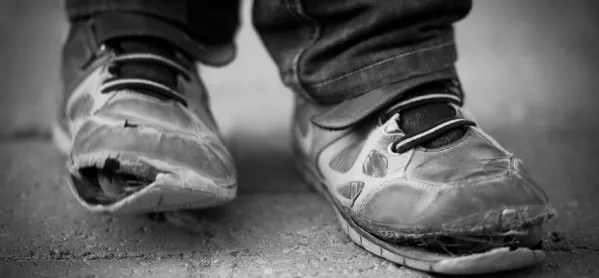- Home
- ‘Decisive steps’ needed to tackle child poverty
‘Decisive steps’ needed to tackle child poverty

Ambitious government targets to reduce child poverty will stall unless more is done to enable fair work with flexible hours and decent pay, a new report has found.
In its state-of-the-nation report, Poverty in Scotland 2018, the Joseph Rowntree Foundation (JRF) is today warning that one in four (230,000) children in Scotland are living in poverty.
The social policy research charity says that the Scottish government “has made some progress towards loosening poverty’s grip”, but adds that child-poverty targets will not be reached unless the SNP takes “the decisive steps needed to make the transformational change required for Scotland’s children”.
The report - which comes as the Poverty Alliance launches its Challenge poverty in Scotland? Aye we can! campaign, which seeks to show how poverty can be ended - says that, in most cases, children are in poverty because their parents are restricted by a lack of work; this is mainly due to disability or the struggle to juggle work and childcare. In the majority of cases, it is the mother who works part-time or who is locked out of the job market, it states.
With changes to UK benefits driving an increase in child poverty, according to the JRF, the organisation is calling on the Scottish and UK governments to take action. A shift in attitudes, policy and practice is needed on childcare, flexible work and benefits, it says.
Scotland’s largest teaching union, the EIS, said last year that poverty was tightening its grip on “alarmingly high numbers of Scotland’s children”.
Two-thirds of respondents to a survey run by the union reported seeing an increase in the number of pupils experiencing poverty. Earlier this year, the Scottish Parliament’s education and skills committee called on the government to poverty-proof education after it heard evidence about hidden costs incurred by parents, including prohibitively expensive school uniforms.
JRF chief executive Campbell Robb said families in Scotland were facing impossible choices, such as whether to pay the rent, put food on the table or pay for heating. However, it was possible to end “this unacceptable situation”, he added.
He said: “The Scottish government needs to lead the way, working with and encouraging employers to open opportunities for parents with disabilities or caring commitments, so everyone can build a decent and secure life.”
Labour said the report showed the desperate need for real change and called on the government “to make radical use of the powers of the Scottish Parliament to build a fairer country”.
Labour spokeswoman for the eradication of poverty and inequality, Elaine Smith, said: “In the face of these figures, it would be inexcusable to leave the powers of the Scottish Parliament gathering dust on a shelf. Labour wants to see child benefit increased, as a matter of urgency, to tackle poverty.”
Communities secretary Aileen Campbell said: “The Joseph Rowntree Foundation’s Report is welcome. It explains clearly the challenges we face whilst also outlining how our current programmes, including actions to address the gender pay gap and disability employment can tackle poverty, which remains at unacceptable levels.
“Scotland has consistently had the lowest child poverty rates of the four UK nations. However, as the report makes clear, UK government welfare cuts will significantly increase the number of children in poverty in Scotland - and across the UK. Whilst this means we are tackling poverty with one hand tied behind our back, I know if we take action in the right ways, we have the chance to reduce child poverty to the lowest levels ever in Scotland’s history and that is a future all of us want.
“That is why we are taking firm action through the first Tackling Child Poverty Delivery Plan, which includes £12 million for intensive employment support for parents, a national minimum school clothing grant of £100 to help with essential costs, Best Start Grant payments to help families in the early years, and our commitment to doubling free childcare hours.”
Keep reading for just £1 per month
You've reached your limit of free articles this month. Subscribe for £1 per month for three months and get:
- Unlimited access to all Tes magazine content
- Exclusive subscriber-only stories
- Award-winning email newsletters



